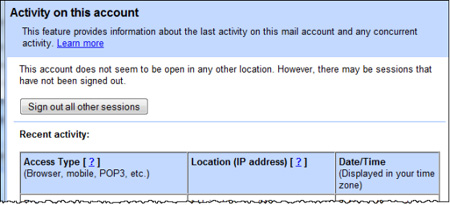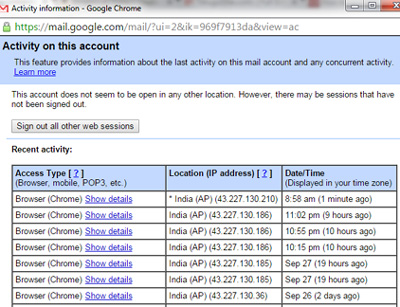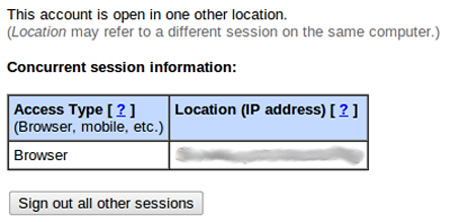Securing Your Gmail
posted on Dec 13, 2018 12:05PM
.jpg)
`There are too many ways for a hacker to get into your mail` - This statement might sound pathetic. But it’s true! Though the data in our mail might not be so valuable, it’s still a part of our life. Further, information such as banking passwords or confidential reports… if accessed might cause enough damage. These are some of the precautions that were needed without going into the technicalities of hacking. As much of the users rely on the Gmail, this article was written in the view point of a Gmail user, though it might be helpful for other users as well…
While your mail is ON:
While we work on the net, we normally keep our Gmail account signed in. But experts warn against this practice, especially when you go through a lot of sites while browsing. A hacker can access your mail by adding filters to your Gmail account which was open by that time. If you are suspicious that such filters might have already been added to your Gmail, go to your Gmail settings and check for the filters section. Consult an expert if your find a filter added to it.
Check for the ACTIVITY:

Gmail keeps a track on our moments in and out of the mail. You can find the report of your Gmail activities by clicking the ‘details’ at the bottom of your page (right side). You can view the kind of browser you’ve logged in, the IP address and the time. Cross check the details if you are suspicious about an unauthorized access.
Logging out from all sessions

We often tend to open our mail at any place. It might be our office or might be a net cafe. But are not sure whether we have logged out, while we get back from the place. Keeping your account open at a public place might be a source of entertainment for someone else. Don’t worry! There is a way to get out of this embarrassing situation. Click the `details` at the bottom of the page, and click `sign out of all other web sessions` of the menu.
Heed the warnings:

Gmail takes enough liberty to warn us. Those warnings might bore us sometimes. But they are indeed of much help to us. Messages such as `This account is open in one other location`, `New sign-in from chrome on windows`, ` The password for your Google Account - *****@gmail.com - was recently changed`… certainly are intended to warn us. It even warns us when someone has tried to access our mail. So let’s think about those warnings and never mark them as spam.
Password:
It’s the most talked about subject regarding our mail. So let’s wrap it up in a few points.
- Never share your password with anyone else, even if you had to share at an emergency… change it immediately.
- Use Alphanumerical and symbols to create a password.
- Don’t use the nouns that are associated with you, such as the names of your family members.
- Change the password immediately if you are suspicious of an access or if you have received or sent any confidential information.
- Be sure of setting a recovery mail through which you can access your mail even if you loose your password.
Don’t allow the ACCESS:

Some sites would often insist on entering into our mail and access our contacts. Never allow such sites to access your mail, until and unless you are completely satisfied about their safety. You might even receive a mail that looks absolutely reliable. Such a mail might ask you in a very pleasing manner to reveal your personal details. Please beware of such mails! Such a practice of abstracting information is called `phishing`- which can be disastrous to your finance.
-Nirjara

.jpg)






.jpg)
.webp)
.webp)


.webp)













.webp)






.webp)
.webp)